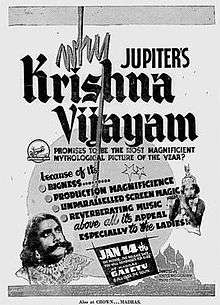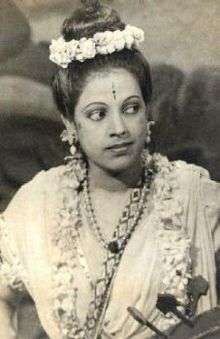Krishna Vijayam
Krishna Vijayam (transl. Krishna's victory) is a 1950 Indian Tamil language film written and directed by Sundar Rao Nadkarni. The film featured Carnatic music singer N. C. Vasanthakokilam in the role of Narada. The film, based on the Epic story of Krishna avatar, featured later day playback singer A. L. Raghavan as the child Krishna. Adult Krishna was played by P. V. Narasimha Bharathi.[2]
| Krishna Vijayam | |
|---|---|
 Theatrical release poster | |
| Tamil | கிருஷ்ண விஜயம் |
| Directed by | Sundar Rao Nadkarni |
| Produced by | M. Somasundaram Mohideen |
| Written by | Velavan Karmayogi |
| Screenplay by | Sundar Rao Nadkarni |
| Based on | Epic Krishna Leela |
| Starring | N. C. Vasanthakokilam P. V. Narasimha Bharathi T. Premavathi R. Balasubramaniam A. L. Raghavan Lakshmiprabha M. R. Santhanam Lalitha and Padmini |
| Music by | S. M. Subbaiah Naidu C. S. Jayaraman |
| Cinematography | P. Ramasamy |
| Edited by | Sundar Rao Nadkarni |
Production company | |
| Distributed by | Jupiter Pictures |
Release date |
|
| Country | India |
| Language | Tamil |
Plot
The film is about the epic story of Krishna, an avatar of Lord Vishnu. The story is about his birth, elimination of his uncle, the King Kamsa and his boyhood Leelas with gopikas.
Cast

- R. Balasubramaniam as Kamsan
- Master A. L. Raghavan as Young Krishna
- P. V. Narasimha Bharathi as Radhakrishnan
- S. A. Natarajan
- N. C. Vasanthakokilam as Naradar
- T. Premavathi as Radha
- M. S. S. Bhagyam
- M. Lakshmiprabha
- Dance
Crew
- Producers: M. Somasundaram
S. K. Mohideen - Director: Sundar Rao Nadkarni
- Screenplay: Sundar Rao Nadkarni
- Dialogues: Velavan, Karmayogi
- Cinematography: P. Ramasamy
- Art Director: P. P. Chowdhri, Kuttiyappu
- Editing: Sundar Rao Nadkarni, P. Venkatachalam
- Choreography: K. R. Kumar, C. Thangaraj
- Photography: K. Anandan
- Lab: Central Studios, Coimbatore
Soundtrack
Music was composed by S. M. Subbaiah Naidu and C. S. Jayaraman. Lyrics were penned by Papanasam Sivan, T. K. Sundara Vathiyar, Bhoomi Palakadas and K. P. Kamakshi. Singers are N. C. Vasanthakokilam, A. L. Raghavan & K. S. Angamuthu. Playback singers are T. M. Soundararajan, Thiruchi Loganathan, S. S. Mani Bhagavathar, P. Leela, K. V. Janaki, T. V. Rathinam & T. R. Bhagirathi.
The song "Navaneetha Kannaney…" sung by N. C. Vasanthakokilam was a hit. The music for this song was scored by C. S. Jayaraman and the lyrics were written by K. P. Kamakshi. Another group song "Ennadi Anniyayum Idhu… Adi Yashoda…", sung by P. Leela, K. V. Janaki, T. V. Rathinam, T. R. Bhagirathi and group was also a popular number. T. M. Soundararajan sang his first song "Radhey Nee Ennai Vittu Pokaathadi".
| No. | Song | Singer/s | Lyricist | Duration (m:ss) |
|---|---|---|---|---|
| 1 | "Navaneetha Kanna" | N. C. Vasanthakokilam | K. P. Kamakshi | |
| 2 | "Eppadi Sakippadhu" | Thiruchi Loganathan, S. S. Mani Bhagavathar, T. M. Soundararajan, K. S. Angamuthu & A. L. Raghavan | 07:59 | |
| 3 | "Ennadi Aniyaayam Idhu" | P. Leela, K. V. Janaki, T. V. Rathinam, T. R. Bhagirathi & K. S. Angamuthu | 07:22 | |
| 4 | "Vaasudevan Avatharithan" | N. C. Vasanthakokilam | 03:22 | |
| 5 | "Radhey Nee Ennai Vittu Pokaathadi" | T. M. Soundararajan | 03:40 | |
| 6 | "Vaasuki Paambu Thaampaki" | T. V. Rathinam & T. M. Soundararajan | 05:00 | |
| 7 | "Porumai Kadalaagiya Boomaadhevi" | N. C. Vasanthakokilam | 04:14 | |
| 8 | "Ullam Ellam Inba Vellam" | T. V. Rathinam & T. R. Bhagirathi | 03:08 |
Reception
Though the film was well made with melodious music, it did not fare as well as expected. The reason may be that by this time, the interest in epic-based stories started waning among the viewers. Specially because it was only the same Jupiter Pictures that previously made Velaikaari, a socially themed story that was well received by the people.
References
- Film News Anandan (23 October 2004). Sadhanaigal Padaitha Thamizh Thiraipada Varalaru [History of Landmark Tamil Films] (in Tamil). Chennai: Sivakami Publishers. Archived from the original on 2 December 2016.
- "Blast from the past - Krishna Vijayam 1950". The Hindu. 21 August 2009. Archived from the original on 29 June 2013.